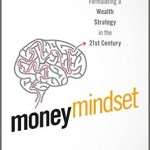In The Money Mindset – Formulating a Wealth Strategy in the 21st Century, Jacob Gold traces the key components for building financial fitness, such as finding the right mindset, understanding risk, asset allocation, and diversification. He introduces the importance of understanding taxes and insurance.
He gets the big picture on taxes, which is that you should pay the minimum allowable, but if you pay a lot in taxes you should feel fortunate because that means you earn a lot. Similarly, he gets the point of insurance, which is solely to transfer risk to another entity.[1]
You could possibly start with this book for a newbie, but it wouldn’t be my first choice by a long shot.
I’m not a fan of a couple of Gold’s approaches.
First, although he says stocks and bonds both make up a portion of many portfolios, he does not guide the reader to know exactly how to come up with an optimal asset allocation. I think there is a correct answer, or at least a fruitful discussion to be had about the right mix between major asset classes.
At one point, presumably through laziness, he introduces an absurd situation, in the course of explaining the advantages of diversification and rebalancing:
“Rebalancing is really a forced way to incorporate the “buy low, sell high” mantra. For example, if you had $100,000 and 70 percent of that money was allocated to stocks, 20 percent to bonds; and 10 percent in cash, it might be that the next year that $100,000 grows to $150,000 but the growth was from the bonds. [Emphasis mine.] Since the bonds appreciated in value, that takes the asset allocation that you had determined based on the risk tolerance questionnaire, and throws the balance of investments out of whack…”
Um, no. Rebalancing is the right idea, but there is no conceivable universe in which your 20 percent allocation to bonds makes your portfolio grow from $100,000 to $150,000 in a year and “the growth was from the bonds.” So that part of the book didn’t appeal to me.
My second problem with the book – and I have found this with the vast majority of personal finance/investing books – is that Gold abdicates responsibility to really teach compound interest. Instead, he returns to the ‘Rule of 72’ (gag, barf) to show how money doubles according to the rule of 72 divided by the annual % return.
Sure, that works, but is entirely too inflexible to use for anything but that simple function. How large will my money grow at 3.5% return per year for 27 years? How large will my money grow at 1.4% per year for 8 years? How large will my money grow at 17.3% per year for 14 years? We need to teach compound interest in a real way, and not depend on the ‘Rule of 72.’ We can do better, people.
Please see related posts:
Book Review: The Only Investment Guide You’ll Ever Need by Andrew Tobias
Book Review: Simple Wealth Inevitable Wealth by Nick Murray
Book Review: Stocks For The Long Run by Jeremy Siegel
The Princess and Compound Interest
[1] Although I don’t think he properly distinguishes between term and whole life insurance.
Post read (352) times.







One Reply to “Book Review: Money Mindset by Jacob Gold”
I just want to know what bonds he is investing in that get him a 250% growth in a year.